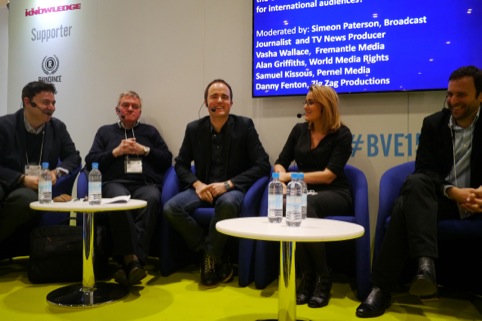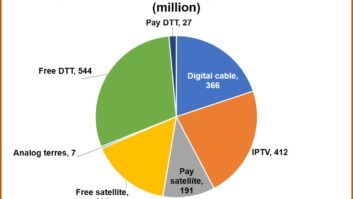
Senior figures from Zig Zag Productions, World Media Rights, Fremantle Media and Pernel Media came together at BVE to discuss the most valuable TV formats in the UK, and how these can be successfully translated for an international audience. Simon Paterson, broadcast journalist and TV news presenter, chaired the panel.
A successful international format must be four things, opened Vasha Wallace, senior vice president of global acquisitions and development at Fremantle Media. It must be stable, ensuring it does well in different countries and with different budgets; transferable; repeatable; and promotable. So what does it mean to talk about a ‘British format’? “We only make stuff for the international market,” said Alan Griffiths, CEO, World Media Rights. “We won’t finance unless it can go to many countries.” World Media Rights specialises in programmes about war, romance, action, adventure and mystery, and most programmes they make feature dramatic reconstruction. “We’re using British creativity,” Griffiths continues, “and selling it to a global market.”
Samuel Kissous, president of Paris-based Pernel Media, agrees on the creative strength of the UK: “I’ve noticed that the British formats have been the best ones. There is a lot of creativity in the UK.” He puts this down to the small number of big, successful channels, BBC, ITV, Channel 4 and Channel 5. Danny Felton, CEO and executive chairman of Zig Zag Productions, believes the term is more fluid: “Formats by their nature don’t have boundaries” he said, however, “historically the US and UK have been the best exporters of formats to date.”
Taking these two major exporters of formats, the panel were asked what the major trends were in the UK, and the impact these have had. A few years ago saw a slew of scripted reality TV shows in the UK and globally. However, now “commissioners are not commissioning pure reality shows in the US,” asserted Griffiths. Viewers are rejecting the format and eschewing TV they see as inauthentic, which poses a real challenge for producers. Viewers want television to be real, but in reality, Griffiths said, it is “the most contrived form of media”. Selling formats in the US is still big business though, and Felton admitted that 50 per cent of all his company’s revenues comes out of the US, which holds “massive opportunity.”
If viewers are rejecting the scripted reality show format, what is it that watchers want? Kissous asserted instead that more factual formats are doing well: those programmes where “the hands of the producer are a bit more hidden.” He also highlighted “big family entertainment” as being in high demand in all territories, but warned what works in one location may fail in another. Ant and Dec’s Saturday Night Take Away has been a hit for ITV, though when it was launched in France “it failed miserably”. This suggests the programme’s success may not have been just the format of the show, but in the presenting talent. Fenton’s answer is more straightforward: “The best selling formats are the ones that have the most structure to them.” He gives Who Wants to be a Millionaire as an example, christening the quiz show as “the daddy of them all”. Selling the format involved selling intricacies like how the lighting was set up and what the set looked like: “if you want to have a hit format” he continued, “you have to have something which can’t be replicated without you.”
Who Wants to be a Millionaire first aired on UK TV screens in 1998 and in the US a year later. Although still popular, what kind of research are the panellists doing to find the next great format hit? Rather than asking audiences, the panellists agreed that it was the commissioners’ opinion which was most sought. “I primarily look for what the commissioners think the audiences will want,” said Griffiths. As well as asking advice, going with your gut feeling is integral in commissioning and selling succcessful formats. Fenton positions himself as “a bit of a futurologist” in predicting what will do well. However, “the bigger companies are more risk-averse,” continued Fenton and Griffiths agreed, citing the constant changes in American TV network schedules and their dependency on ratings as the reason for US companies’ “constant demand for ideas.” Fenton, for example, admitted he sold a show to the US with one line: ‘I Want to Marry Harry’: the show was a $15 million commission. But not all networks can be so risk-averse. The financial problems in the Eurozone have been felt everywhere, and “a lot of channels are a bit desperate at the moment. There hasn’t been a successful format for quite some time,” commented Kissous. Reduced budgets means it has been harder in many markets to produce formats and, as Fenton conceded, there is no point in creating an amazing format that no one else can create outside the deep-pocketed US.
Broadcasters will always be hungry for great content though, and “there’ll always be a slot if you‘ve got an original idea,” said Fenton. An examination of any broadcasters’ top ten shows around the world will reveal that pretty much all have at least one global format, with Wallace giving the example of celebrity dance competitions as being a staple in many broadcasters schedules. Many viewers don’t even realise they are watching a global format. “What’s the biggest show in the UK?” asked Fenton, “The Voice. And that’s a Dutch format!”
From ‘coaching shows’ ten years ago like Super Nanny, followed by the light-hearted group talent challenges like Come Dine With Me and Three in a Bed, to the countless scripted ‘reality’ shows, formats are always changing and although most are transferable, there are often tweaks and alterations needed to suit local audiences. Yet the panel agreed on the strength of homegrown formats, and Wallace named Britain’s production expertise as “second to none”. She added that “globalisation has meant good ideas can come from anywhere and launch in places they many not have launched before” which will surely assure the future of British formats at home and overseas.
Producers’ Theatre







